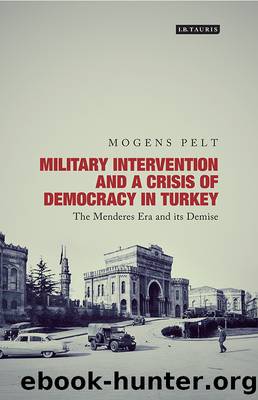Military Intervention and a Crisis of Democracy in Turkey: The Menderes Era and Its Demise by Mogens Pelt

Author:Mogens Pelt [Pelt, Mogens]
Language: eng
Format: epub
Tags: Political Science, International Relations, General, History, Europe
ISBN: 9781786734990
Google: QaiMDwAAQBAJ
Publisher: Bloomsbury Publishing
Published: 2014-06-13T01:48:36+00:00
Domestic repercussions
The Turkish government, according to US Air Force intelligence, was âdeeply shockedâ by the coup dâétat in Baghdad. At the same time Turkish public opinion and journalists, in particular, indicated no grief for the violent death of Prime Minister Nuri-Said who, they suspected. ânever really lost his early antipathy for Turksâ.67
It was in this situation that the young and rising CHP star Bülent Ecevit chose to openly challenge the wisdom of Menderesâ pro-Western foreign policy toward the Middle East. What happened in Iraq, Ecevit stated in the CHP organ Ulus, was not unexpected. It was the West and the Turkish government who for many years had deceived themselves and failed to see the facts: sooner or later Iraq would join the United Arab Republic or at least establish a federal union with that republic. Nor did Ecevit expect Jordan to remain independent for long. What Ecevit predicted was the establishment of Arab unity in the shape of one large Arab state.
Against this scenario, Menderesâ pro-Western policy, as represented by Ankaraâs leading role in the Baghdad Pact, and Turkish hostility vis-Ã -vis Arab nationalism, symbolized by Menderesâ bellicose policy towards Syria, could be depicted as totally bankrupt. In an ill-disguised attack on this policy and on the US and British actions in Lebanon and Jordan, Ecevit vituperated their âdemonstrations of powerâ as no answer to the problems of the second part of the twentieth century; the West must show a better understanding of the Arabsâ aims of economic independence, he said. If the West did so and Arab nationalism kept its ambitions within the limits of its interests, the Arab world might regard the West in a neutral fashion.68
Inönü demonstrated that he, too, was ready to challenge the foreign policy of the DP, and took steps to call for convening the Grand National Assembly in a special session to discuss the Middle Eastern crisis. Although the debate of the session was secret, CHP sources hinted that they intended to âhit hardâ on all aspects of Menderesâ foreign policy.69 Inönü intended to criticize both the use of Adana as a deployment area for US troops destined for missions outside Turkey and the possibility that the American armoury in Turkey might have been provided with nuclear weapons without the knowledge of the Grand National Assembly.70
Inönüâs decision was somewhat unusual because it had been the norm for the opposition to abstain from public criticism of foreign policy. Nevertheless, Inönü declared that Turkey taking side in Lebanonâs internal politics was wrong and harmful; its immediate adoption of a hostile attitude toward the new Iraqi administration was wrong and unjust: âWe should be on guard against the provocative line which may even cause an accident leaving us all one [alone].â71 Thus, Inönü took issue with Menderesâ pro-Western policy towards Nasserâs Egypt in particular, and Arab nationalism in general and he did so in an unmistakable manner.
In a clear address to Menderes, CHP publication Ulusâ headline read: âYou are leading the nation to disasterâ while an editorial
Download
This site does not store any files on its server. We only index and link to content provided by other sites. Please contact the content providers to delete copyright contents if any and email us, we'll remove relevant links or contents immediately.
| Bahrain | Egypt |
| Iran | Iraq |
| Israel & Palestine | Jordan |
| Kuwait | Lebanon |
| Oman | Qatar |
| Saudi Arabia | Syria |
| Turkey | United Arab Emirates |
| Yemen |
Empire of the Sikhs by Patwant Singh(23086)
The Wind in My Hair by Masih Alinejad(5095)
Rise and Kill First by Ronen Bergman(4789)
The Templars by Dan Jones(4689)
The Rape of Nanking by Iris Chang(4213)
12 Strong by Doug Stanton(3550)
Blood and Sand by Alex Von Tunzelmann(3205)
Babylon's Ark by Lawrence Anthony(2679)
The History of Jihad: From Muhammad to ISIS by Spencer Robert(2628)
No Room for Small Dreams by Shimon Peres(2368)
Inside the Middle East by Avi Melamed(2357)
The Turkish Psychedelic Explosion by Daniel Spicer(2357)
Gideon's Spies: The Secret History of the Mossad by Gordon Thomas(2353)
Arabs by Eugene Rogan(2299)
The First Muslim The Story of Muhammad by Lesley Hazleton(2271)
Come, Tell Me How You Live by Mallowan Agatha Christie(2260)
Bus on Jaffa Road by Mike Kelly(2159)
1453 by Roger Crowley(2031)
Kabul 1841-42: Battle Story by Edmund Yorke(2029)
